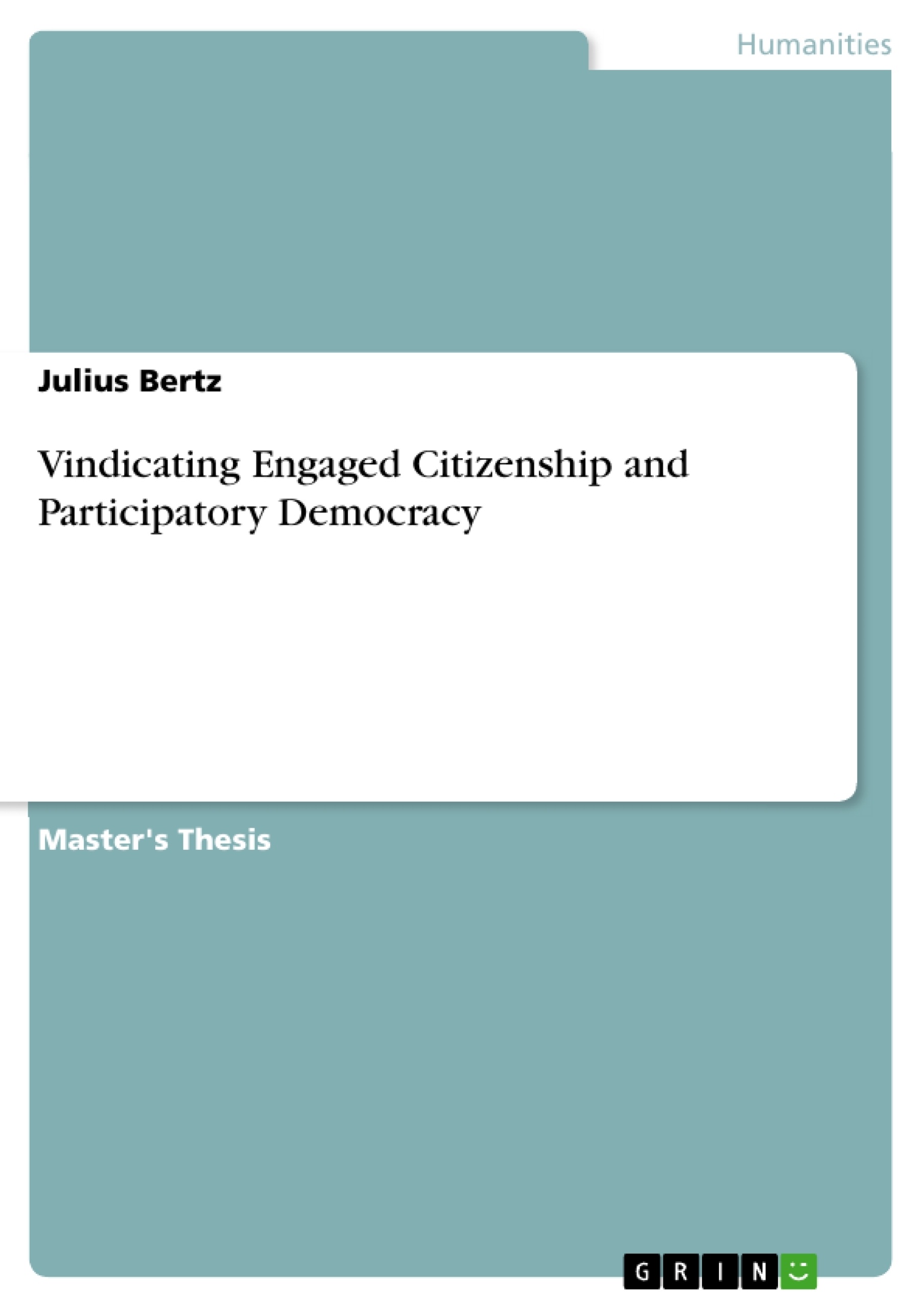Civic participation and democracy are widely discussed issues. However, motivations for a citizen to actually participate are rarely presented. The present thesis will defend the notion of engaged citizenship as an attitude of habitual interest and care in relation to an individual's political community. It is to follow public concerns and discourse with an active mind and actual action if seen necessary. Further, the desirability of engaged citizenship in a democratic context will be vindicated, and its necessity for a participatory deliberative democratic system will be explicated.
Moreover, it will be argued that engaged citizenship and participatory democracy mutually condition each other. In this context, the thesis aims to provide incentives for the individual citizen to engage with his or her political community and social as well as natural environment. Guided by a Wittgensteinian and Habermasian framework, the democratic state is interpreted not only as a form of governance, but also as a reciprocal mode of political life that stays in need to be supported by an engaged citizenry. In order to put these aims into practise, the work public schools as well as private forms of civic engagement play a vital role.
Table of Contents
- Preliminary Thoughts
- Engaged Citizenship and Normativity
- Merits and Motives seen through the Lenses of a Political Community
- Individual Steps facilitated
- Reciprocity and Deliberative Participatory Democracy
- Reciprocity: Amy Gutmann and Dennis Thompson
- Participatory Conceptions of Democracy and Private Autonomy: Jürgen Habermas and David Held
- Contentions
- Concluding Thoughts
Objectives and Key Themes
This essay argues in favor of engaged citizenship as a crucial element for a participatory deliberative democratic system. It aims to defend the notion of engaged citizenship as an attitude of habitual interest and care in relation to one's political community, advocating for active participation in public discourse and action when necessary.
- The significance of engaged citizenship in a democratic context
- The mutual conditioning of engaged citizenship and participatory democracy
- The role of the democratic state as a reciprocal mode of political life
- The importance of citizen engagement in shaping the life-world
- The need for a Wittgensteinian and Habermasian framework to understand engaged citizenship
Chapter Summaries
The first chapter introduces the concept of engaged citizenship, outlining its significance and its relationship to participatory democracy. It also establishes the framework for the argumentation, focusing on vindication rather than justification due to the inherent subjectivity of normative claims.
Chapter 2 delves deeper into the concept of engaged citizenship, exploring its merits and motivations within the context of a political community. It also discusses the practical steps individuals can take to foster engaged citizenship.
Chapter 3 examines the relationship between reciprocity and deliberative participatory democracy, drawing on the work of Amy Gutmann and Dennis Thompson. It also explores the connection between participatory democracy and private autonomy, referencing the ideas of Jürgen Habermas and David Held.
Keywords
Engaged citizenship, participatory democracy, deliberative democracy, reciprocity, life-world, communicative reason, public reason, Wittgenstein, Habermas, Rawls, Gutmann, Thompson, Held.
Frequently Asked Questions: Engaged Citizenship & Democracy
What is the definition of "engaged citizenship"?
Engaged citizenship is an attitude of habitual interest and care towards one's political community, involving active participation in public discourse and social action.
How do engaged citizenship and participatory democracy relate?
They mutually condition each other; a participatory system requires active citizens to function, while the system itself provides the space for such engagement.
What is the role of the state in this framework?
The democratic state is seen as a reciprocal mode of political life that must be supported and shaped by an engaged citizenry rather than just a top-down governance structure.
Which philosophers are central to this thesis?
The work is primarily guided by the frameworks of Ludwig Wittgenstein and Jürgen Habermas, alongside ideas from John Rawls and David Held.
How can engaged citizenship be fostered in practice?
Public schools and private forms of civic engagement play a vital role in educating and motivating individuals to take part in their community's life-world.
- Quote paper
- Julius Bertz (Author), 2015, Vindicating Engaged Citizenship and Participatory Democracy, Munich, GRIN Verlag, https://www.grin.com/document/323644



